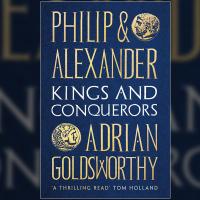In the space of just forty years, the small and troubled kingdom of Macedonia went from an inconsequential backwater on the northern edge of Greece to a superpower that had challenged, and beaten, the greatest empires of the known world. In large part, this was down to the aspirations and actions of just two people: King Philip II of Macedon and his son, the man history calls Alexander the Great. The consequences of their ‘lightning wars’ against their neighbours, Persia, and western India were wide-ranging and far-reaching, and commentators have been alternately intrigued and horrified ever since. Adrian Goldsworthy’s Philip and Alexander: Kings and Conquerors revisits this familiar ground, providing a detailed, well-researched account of the men and their conquests in a fast-paced and gripping new rendition of the story.
It might be wondered why Goldsworthy thought it necessary to write another book on the kings; after all, Alexander the Great has attracted so much academic attention, despite the limitations of the sources, that ‘Alexanderland’ is teeming with biographies, commentaries, and scholarly debates. Yet his reasoning is sound, and explained in the very title of the book. While Alexander himself has received considerable attention, the life and deeds of his father have attracted far less, and few have attempted to look at the two reigns combined. But as Goldsworthy eloquently puts it, Philip ‘created the circumstances allowing Alexander to hurl himself at the Persian empire and vanquish it. Without Philip there could have been no Alexander’. In order to understand the son, one must understand the father. Thus, Goldsworthy turns almost half the book into a compelling narrative of Philip’s, and Macedonia’s, rise to pre-eminence, providing balance to what is so often a lop-sided story. Once read, it is difficult to argue against the author’s position that Philip, too, should be considered ‘great’.
In order to understand the son, one must understand the father. Thus, Goldsworthy turns almost half the book into a compelling narrative of Philip’s, and Macedonia’s, rise to pre-eminence, providing balance to what is so often a lop-sided story. Once read, it is difficult to argue against the author’s position that Philip, too, should be considered ‘great’.
Balance is the driving force of this book. While the author unashamedly makes no apologies for his approach, looking at the how, the where, the what, the why of these ‘great men’ in the traditional way of military and political history, he does so in a wider context, explaining to his inevitable critics the necessity of staying within the sources, and the dangers of reading our own views and ethical codes backwards onto a very different society. In doing so, he neatly sidesteps the ongoing, yet impossible, debate on whether either or both kings were ‘good’ or ‘bad’. Instead, he lets the reader decide, while reminding us that ‘they and those around them were simply people, like us, albeit products of very different cultures.’ History is always shades of grey; it is never, and should never be, seen in terms of black and white. Goldsworthy’s book thus offers a cautionary note about letting current fashions and concerns influence us to too great an extent. Instead, there is a clear and definite rallying call for ‘old school’ narrative history.
History is always shades of grey; it is never, and should never be, seen in terms of black and white. Goldsworthy’s book thus offers a cautionary note about letting current fashions and concerns influence us to too great an extent. Instead, there is a clear and definite rallying call for ‘old school’ narrative history.
The book is therefore a masterclass in good, sound popular history. It is not only lively and entertaining; it is based on excellent research. Yes, Goldsworthy uses later Greek and Roman sources, with a heavy reliance on what used to be considered the most accurate source by Arrian, but this is hardly surprising given the paucity of other information. However, what he does do very well is explain the limits of these sources, both in the main text and in a handy little appendix. In addition, despite stating that he doesn’t intend to ‘revolutionize the academic understanding of the period’, Goldsworthy contributes his own tuppence-worth to a number of debates: he considers the ‘Macedonia question’ (whether Macedonia could even be considered as part of Greece); he considers the influence of the East on Alexander; and perhaps most of all, he firmly states his opinion on the usefulness of a biographical approach in dealing with the Macedonian kings. Philip and Alexander: Kings and Conquerors provides a resounding affirmative to the question of whether or not a decent biography is a valuable addition to the Alexander canon. Goldsworthy looks at the sources afresh, bringing with him the expertise gained in a career of writing about ancient warfare, and contributes in a thoroughly convincing way to current academic debates. But he also keeps the drama and the protagonists immediate, painting a vivid picture of the battles, the places, the times, and the men. It is, therefore, a must-read for anyone with an interest in Ancient Greece.
Philip and Alexander: Kings and Conquerors provides a resounding affirmative to the question of whether or not a decent biography is a valuable addition to the Alexander canon. Goldsworthy looks at the sources afresh, bringing with him the expertise gained in a career of writing about ancient warfare, and contributes in a thoroughly convincing way to current academic debates. But he also keeps the drama and the protagonists immediate, painting a vivid picture of the battles, the places, the times, and the men. It is, therefore, a must-read for anyone with an interest in Ancient Greece.


